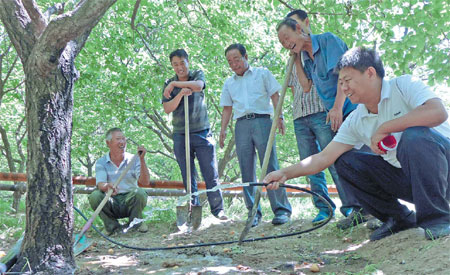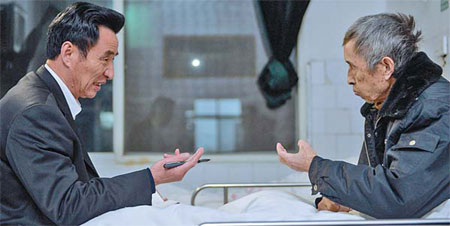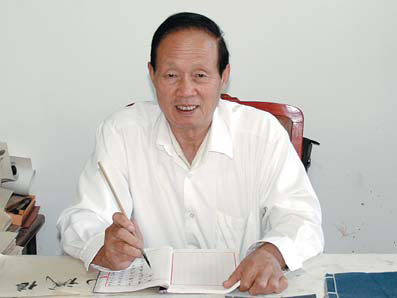Party seeks to boost ties with the public
Updated: 2013-07-19 07:07
By He Na in Beijing and Zheng Jinran in Hebei (China Daily)
|
||||||||
|
Officials from the local water resources bureau at Tumd Left Banner in the Inner Mongolia autonomous region work with farmers from the region's Shatugou village. Jia Lijun / Xinhua |
|
Yang Shaojun (left), a deputy at the National People's Congress, talks with Huang Yuansheng, a patient in Changde No 7 People's Hospital in Hunan province. Yang always tries to elicit first-hand information from the public. Bai Yu / Xinhua |
|
Zheng Mengchen, 66, Party secretary of Gangshang village for 30 years, has filled 183 notebooks with details of good deeds performed by local people. Provided to China Daily |

'Mass Line' campaign targets corruption and bureaucracy, report He Na in Beijing and Zheng Jinran in Hebei province.
At first glance, Gangshang looks like any other village in China. An asphalt road connects it with the outside world and rows of single- and two-story houses line both sides of the main road.
However, on closer inspection you can see there are no security bars on the windows of the houses or village stores, and even bicycles are left unlocked.
Li Hailong, 26, said locks and chains are unnecessary because there are no thieves in the village and the residents always help each other in times of need.
Gangshang is an oasis of security in the countryside of Hebei province. The locals attribute that to their long-standing village Party chief Zheng Mengchen and the public books of merit in which he records good deeds.
For his part, Zheng, 66, who has held the post for more than 30 years, said the situation is the result of excellent relations between the Party and the people.
The story goes back a long way. In 1982, Fan Zhenguo found a large bag of wheat, which was worth a lot of money in those days. However, instead of keeping it, the villager handed it to the authorities. In response, Zheng held a meeting where he publicly praised Fan and recorded his act in the book of merit. It was the start of a tradition of mutual aid that exists in Gangshang to this day.
Since then, no matter how trivial the deed, it's recorded and the benefactor is praised at a public meeting. So far, Zhang has filled 183 notebooks with details of civic responsibility and his mobile phone acts as a hotline for villagers to raise issues of local importance. The village committee visits local homes regularly to gauge public opinion before any major decisions are taken.
Gangshang, population 2,400, hasn't had a recorded crime in almost three decades, one of the factors that's attracted investment from more than 20 companies and helped to alleviate poverty.
Thirty years of change
Since Deng Xiaoping initiated China's opening-up and reform policy in the late 1970s, the country has become the world's second-largest economy, with a concomitant rise in the standard of living. The agricultural tax has been abolished, each child gets nine years of free compulsory education and a basic medical care system has been established that provides cover for almost the entire population. This has contributed to a durable relationship between the Party and the people. The number of Party members has risen from just 50 in 1921, the year the CPC was founded, to more than 85 million by the end of 2012.
However, places such as Gangshang remain the exception, not the rule. The CPC is faced with a complex balancing act as it looks to maintain its ties with the public, because the country's rapid economic and social development has resulted in conflicts between different social groups, mainly centered around official corruption and social inequity.
The problems have not gone unnoticed and at a conference in April the Political Bureau of the CPC Central Committee decided to launch the "Mass Line" campaign, providing guidelines under which CPC members and officials are required to prioritize the interests of the people and boost ties between the Party and the public.
On June 18, around two weeks before the 92nd anniversary of the founding of the CPC, Xi Jinping, China's top political leader, reaffirmed the importance of the mass line and stressed that public support is an issue that goes to the very heart of the CPC, its survival or extinction, reported the Xinhua News Agency. "Relations between the Party and the people face grave challenges, because undesirable elements such as formalism, bureaucratism, hedonism and extravagance are undermining those relations," Xi was quoted by Xinhua as telling the conference.
The main task of the yearlong campaign is to establish a new working style and undertake a "thorough cleanup" of damaging elements, which have been dubbed the "four undesirable work styles". The campaign will focus heavily on officials at or above county level.
'Look in the mirror'
Xi demanded that Party members should "look in the mirror, groom yourself, take a bath and seek remedies". More prosaically, that means members should reflect on their own practices and correct any misbehavior. The central government also dispatched 45 teams, with provincial- or ministerial-level officials as leaders, to different regions and units to supervise the campaign and ensure its success.
To push the campaign forward and set an example, Xi traveled to north China's Hebei province on July 11 and 12, visiting villages, communities, enterprises and government departments to listen to opinions and review local education campaigns.
He also visited Zhengding county, where he worked as county vice-Party secretary and then Party secretary from 1982 to 1985, to speak to residents of Tayuanzhuang village.
"Our purpose is to serve the people," he said. "With this kept in mind, one never forgets the people in the places one has worked."
Other members of the Poliburo also traveled around the country; Premier Li Keqiang toured the Guangxi Zhuang autonomous region in the south, while other top leaders also headed off on tours of inspection.
The campaign is the latest in an ongoing series of attempts to ensure that Party members adhere to the new policies and uphold long-standing traditions.
New rules
Zhen Xiaoying, former vice-president of the Central Institute of Socialism, welcomed the campaign, saying it's both necessary and urgently needed.
But she cautioned that campaigns of this type typically only last for a limited time, which can result in problems re-emerging when the campaign ends. Zhen said success will only be guaranteed if a mechanism to regulate members' behavior is put in place.
She was pleased by the news that the central government is collecting ideas and suggestions from the grassroots and think tanks, and is planning two new long-term Party rules to ensure political stability.
The establishment of rules and regulations in the form of laws reflects the leadership's determination to confront persistent problems, such as overweening bureaucracy, corruption and a perception that the people are alienated from the Party and its aims, she added.
Gao Xinmin, a professor at the CPC Party School, said: "The rise and fall of parties in many other countries during the past 20 years has shown that no matter how long a party has held power, if it loses the support of the people, it will inevitably fall. People don't get many chances to see the top Party leaders. That means they naturally interpret the behavior of individual Party members as being indicative of the behavior of all Party members. Every member should behave correctly, because individual cases of bad behavior can damage the image of the Party as a whole."
Gao believes that many of the mass disturbances that have occurred in recent years were the result of the four undesirable work styles, when officials made decisions that the public found unpalatable.
"Residents of Shifang, in Sichuan province, protested to the city government in July last year. They insisted that a project to process heavy metals it had introduced should be abandoned because of environmental concerns. If local officials can be made more aware of public opinion before they initiate projects, incidents of that kind are less likely to occur," she said.
"Not every issue can be resolved through economic development. The public has a strong desire to participate in the decision-making process and the supervision of national affairs via the Internet and new media."
However, she was skeptical about the current system of peer-based supervision, saying it has no real effect.
Membership rises
Data from the CPC Central Organization Department show that in 2012, the number of Party members rose by 2.5 million, or 3.1 percent, from the year before.
If corruption among officials cannot be curbed effectively and the relationship between the Party and the people cannot be improved, the rapid increase in the number of Party members may not be a good sign, warned Wei Qingyuan, professor of the China Executive Leadership Academy in Jinggangshan, Jiangxi province.
"Luckily, the top leaders realized the gravity of the situation and reaffirmed the importance of the mass line by tackling the problems head on," he said.
Wei regards the mass line campaign as an extension of a series of "humility measures" announced by Xi. They included dispensing with large, orchestrated crowds, banners, red carpets and heavy traffic control when members of the leadership make visits to the provinces or large urban centers.
Meanwhile, tough measures have been implemented to curb corruption and some senior officials have been investigated and punished.
The former railways minister, Liu Zhijun, was sentenced to death with a two-year reprieve after being found guilty of accepting bribes and abuse of power. Meanwhile, Liu Tienan, former deputy director of the National Development and Reform Commission, and Li Chuncheng, former vice-secretary of the CPC committee in Sichuan province, were both removed from their positions after allegations of corruption.
"The top leaders received good feedback from these measures and I believe the mass line campaign will be much tougher than any that preceded it. I expect to see more cases of corruption uncovered," said Wei.
"Our school has designed a number of mass-line themed courses and we will arrange for students to visit villages and hear local opinions," he said.
Greater transparency
Zhen said imposing new rules to regulate the behavior of Party members is not enough; the rules must be enforced as strictly as laws.
She also recommended that officials' assets, such as property, should be disclosed to the public. "That can be a precondition of promotion. If officials refuse to allow transparency in their affairs, they will lose their chance of promotion," she said.
Nearly 4,700 county- or higher-level cadres were punished by the CPC's disciplinary watchdog last year, and 961 officials at county-level or above have been referred to the authorities for investigation, according to figures from the Central Commission for Discipline Inspection.
Gao said a long-term mechanism to cope with corruption is essential and the rule of law should always be paramount. In the meantime, intra-Party and public supervision are also required, she said.
On July 10, the State Council, China's cabinet, agreed a timetable for the disclosure of government spending on receptions, vehicles and overseas trips, as well as information on investigations into major accidents. The disclosure date is likely to be revealed later in the year.
Contact the writers at hena@chinadaily.com.cn and zhengjinran@chinadaily.com.cn
Zhang Yuchen contributed to this story.
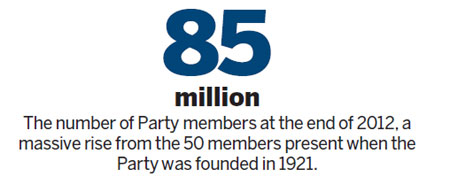
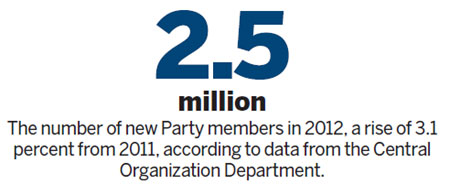
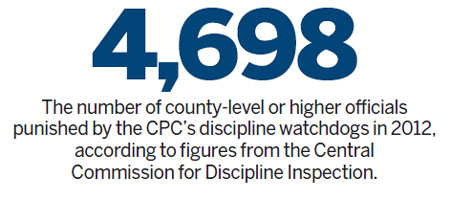
(China Daily USA 07/19/2013 page5)
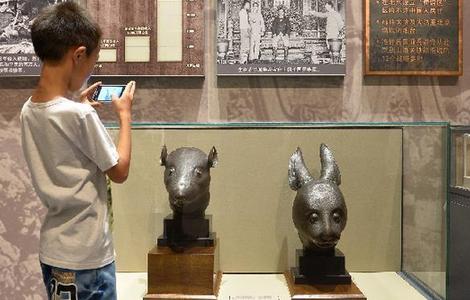
 Rat, rabbit head sculptures on display
Rat, rabbit head sculptures on display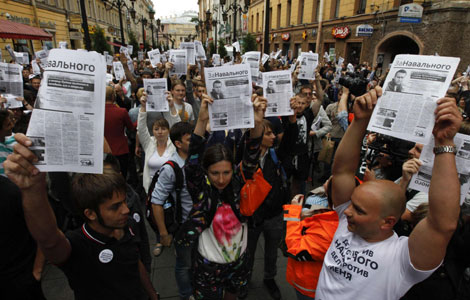
 Russia jails opposition leader
Russia jails opposition leader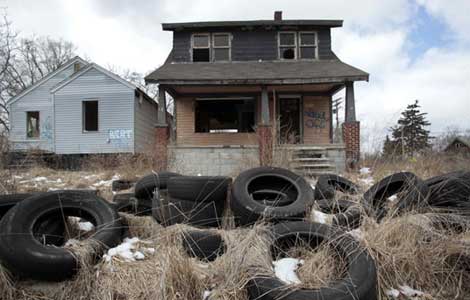
 Detroit files biggest ever US municipal bankruptcy
Detroit files biggest ever US municipal bankruptcy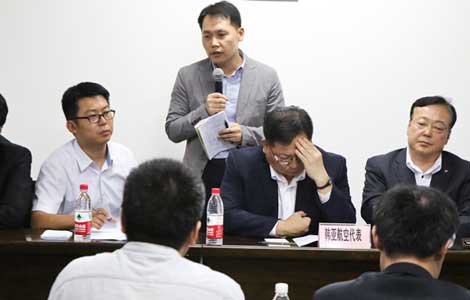
 Plane crash victims' parents seek answers
Plane crash victims' parents seek answers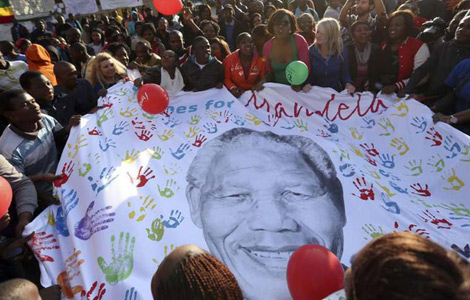
 'Improving' Mandela marks 95th birthday
'Improving' Mandela marks 95th birthday
 Qingdao eatery finds use for pesky seaweed
Qingdao eatery finds use for pesky seaweed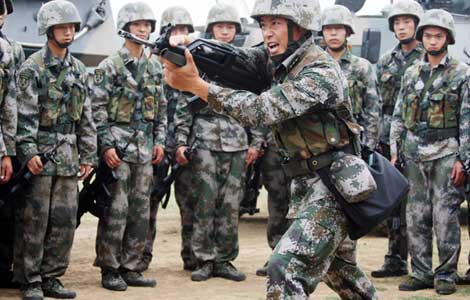
 From university campus to boot camp
From university campus to boot camp
 FIFA head: World Cup in Brazil could be mistake
FIFA head: World Cup in Brazil could be mistake
Most Viewed
Editor's Picks

|

|

|

|

|

|
Today's Top News
Monetary system needs overhaul, says report
US companies seek tougher enforcement of IP laws
Syrian refugees demand help from Kerry at camp
Second iPhone shock leaves man in coma
China's government spends less in 2012
Pregnant Olympic runner dies, baby saved
Detroit files biggest ever US municipal bankruptcy
Obama weighs canceling Moscow talks with Putin
US Weekly

|

|
